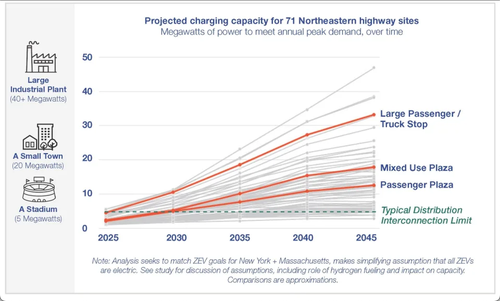
A new report from the electricity and gas utility National Grid (which serves parts of New York and Massachusetts) found a rapid increase in electric vehicles on the city streets and highways will require upgraded power grids to handle all the new demand. By 2035, a charging station could demand as much power as a sports arena or small town.
National Grid expects by 2035, large charging stations serving EVs, from SUVs and pickup trucks to delivery vans and semi-trucks, would require 19 megawatts of peak power -- that's approximately what a small town uses. In 2045, those large charging stations could demand upwards of 30 megawatts of capacity, with peak usage of a large manufacturing plant.
National Grid said current charging stations couldn't serve the EV demand of the future, indicating significant power-grid improvements would be needed. It said expanding the charging infrastructure would take time:
"Building these high-voltage interconnections and upgrades can take years, which is why it's important to take action right now.
"By making 'no-regrets' upgrades at 'no-regrets' sites, we can make sure fast-charging is there when drivers need it—and not a moment too late," the report said.
Today, the impact of EV charging on the grid is small, and there is enough excess capacity to handle the current fleet of cars, SUVs, vans, and pickup trucks.
As EV adoption expands, so will the electricity demand, and as we've noted, nuclear power generation will be the best form of on-demand clean energy. The White House understands nuclear is the future for a sustainable clean grid, as they rush to secure a "large amount" of funding for a domestic uranium strategy.
Unreliable solar and wind won't be enough to power the Biden administration's ambitious plan for half of all new vehicles sold in 2030 to be electric. Meanwhile, California set a target of 2035 to phase out the sale of new gasoline-powered light-duty vehicles.
Momentum is certainly building to electrifying vehicle fleets. In doing so, increasing investments in zero-emission nuclear power production and sourcing uranium domestically will be the key to sustainably powering future EV demand.
A new report from the electricity and gas utility National Grid (which serves parts of New York and Massachusetts) found a rapid increase in electric vehicles on the city streets and highways will require upgraded power grids to handle all the new demand. By 2035, a charging station could demand as much power as a sports arena or small town.
National Grid expects by 2035, large charging stations serving EVs, from SUVs and pickup trucks to delivery vans and semi-trucks, would require 19 megawatts of peak power — that’s approximately what a small town uses. In 2045, those large charging stations could demand upwards of 30 megawatts of capacity, with peak usage of a large manufacturing plant.
National Grid said current charging stations couldn’t serve the EV demand of the future, indicating significant power-grid improvements would be needed. It said expanding the charging infrastructure would take time:
“Building these high-voltage interconnections and upgrades can take years, which is why it’s important to take action right now.
“By making ‘no-regrets’ upgrades at ‘no-regrets’ sites, we can make sure fast-charging is there when drivers need it—and not a moment too late,” the report said.
Today, the impact of EV charging on the grid is small, and there is enough excess capacity to handle the current fleet of cars, SUVs, vans, and pickup trucks.
As EV adoption expands, so will the electricity demand, and as we’ve noted, nuclear power generation will be the best form of on-demand clean energy. The White House understands nuclear is the future for a sustainable clean grid, as they rush to secure a “large amount” of funding for a domestic uranium strategy.
Unreliable solar and wind won’t be enough to power the Biden administration’s ambitious plan for half of all new vehicles sold in 2030 to be electric. Meanwhile, California set a target of 2035 to phase out the sale of new gasoline-powered light-duty vehicles.
Momentum is certainly building to electrifying vehicle fleets. In doing so, increasing investments in zero-emission nuclear power production and sourcing uranium domestically will be the key to sustainably powering future EV demand.







